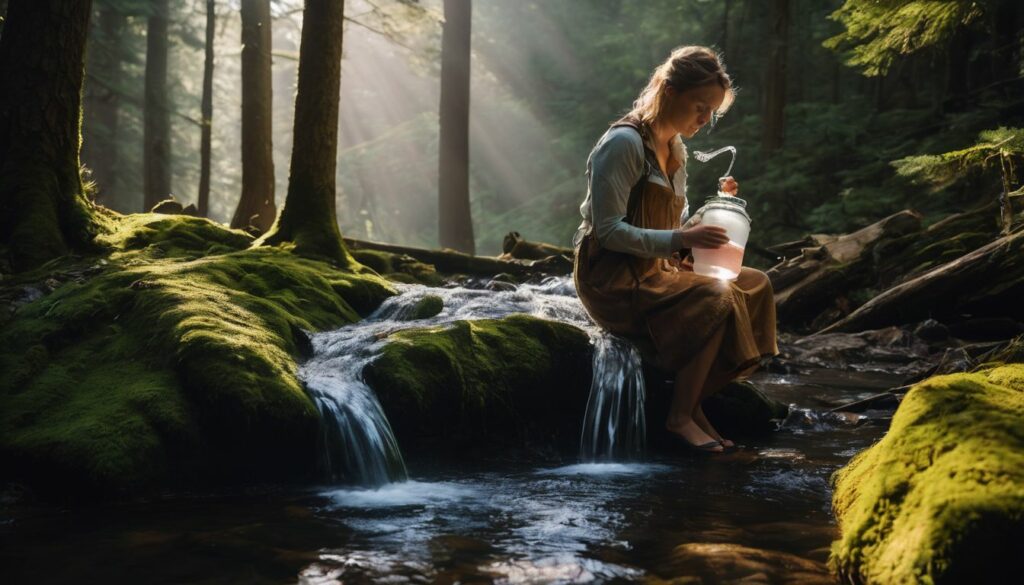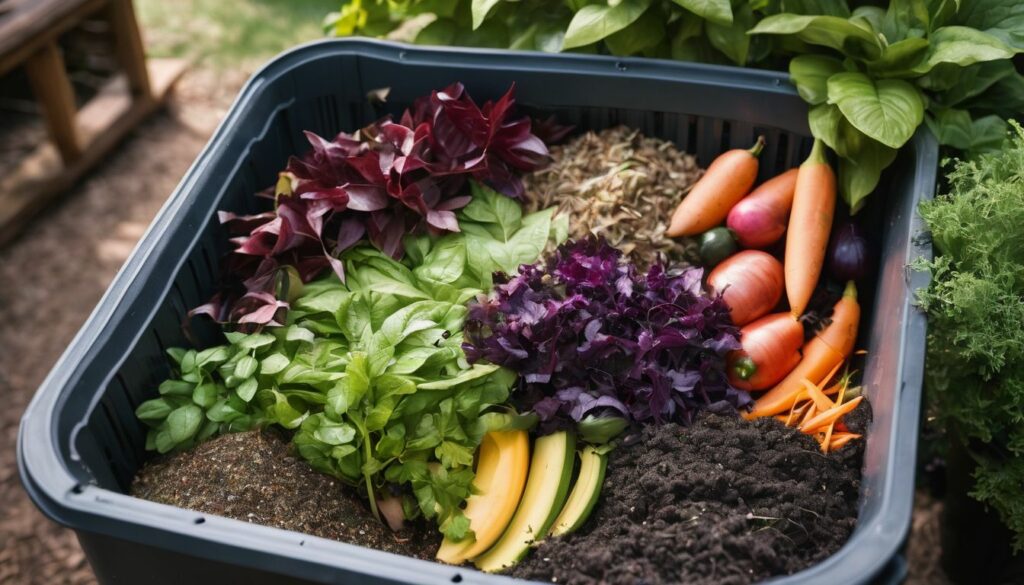Do you find the idea of setting up an off-grid water system a bit daunting? Believe me, you’re not alone. With over 15% of Americans drawing their drinking water from private well systems, it’s clear that off-grid solutions are more common than one might initially realize.
In this blog post, we will explore a wide array of practical and efficient options – ones that could genuinely satisfy your appetite for self-reliance. So let’s delve into this fascinating world where sustainability gracefully intertwines with innovation!
Key Takeaways
- Off-grid water sources include well water, lake water, rainwater, and natural springs. These sources can provide a sustainable and independent supply of clean water for off-grid living.
- Methods of transporting water from the source to the off-grid cabin include using off-grid powered systems, such as windmills or solar-powered pumps, or relying on hand-powered alternatives like manual hand pumps.
- Storing off – grid water can be done using options such as rain barrels, cisterns, underground water tanks, and above ground water tanks. Each option offers effective solutions for ensuring a sufficient supply of water during dry spells or emergencies.
- Filtration and purification systems are essential for maintaining a safe and clean drinking water supply in remote locations. Solar-powered filtration systems and hand-cranked filtration systems are efficient and eco-friendly options for purifying water in off-grid environments. Gravity-fed filtration systems offer simplicity and cost-effectiveness in removing impurities from the available water source.
Off-Grid Water Sources
In off-grid living, there are various water sources to consider for your cabin’s needs such as well water, lake water, rainwater, and natural springs.
Well water
Well water is a top pick for many living off-grid. It’s great for cabins or far-off places. Digging a well brings up clean, clear water from deep underground. This kind of water is naturally cool and usually safe to drink.
With the right gear, you can pump it straight into your cabin. Having your own well means that no matter what happens, you will always have access to fresh water.
Lake water
Lake water is one of the main sources for off-grid water systems. It can be a reliable and sustainable option for those living in cabins or remote areas. Lake water can be collected and used for multiple purposes including drinking, cooking, and irrigation.
However, it is important to note that lake water may contain impurities and contaminants that need to be treated before it is safe to use. This can be done through various filtration and purification methods such as solar-powered or hand-cranked filtration systems.
By utilizing lake water as a source for off-grid water systems, individuals can have access to a self-sufficient and independent supply of clean water.
Rainwater
Rainwater is a versatile and sustainable option for off-grid water systems. It can be collected from rooftops or other surfaces and stored for later use. Rainwater harvesting systems are customizable to meet specific property needs, making them an ideal choice for self-sufficiency.
By relying on rainwater, off-grid living becomes more achievable and reduces the demand for traditional water sources. This not only helps in conserving water but also offers a solution to the global water crisis.
With proper filtration and purification systems, rainwater can be used for drinking and agricultural purposes, providing a reliable alternative to municipal or well water supplies.
Natural springs
Natural springs are a valuable source of water for off-grid systems. These springs provide fresh and clean water that can be used for drinking, cooking, and other household needs. They are often found in rural areas or mountainous regions where the water flows naturally from underground sources.
Natural springs offer a sustainable solution as they constantly replenish themselves, ensuring a consistent supply of water. With the right filtration and purification methods, natural spring water can be made safe to drink while retaining its mineral content.
Utilizing natural springs as a water source is an excellent option for those seeking self-sufficiency and independence in their off-grid living arrangements.
Moving Water From the Source to the Off-Grid Cabin
Discover the different methods of transporting water from your off-grid source to your cabin, whether it be utilizing off-grid powered systems or relying on hand-powered alternatives.
Read on to explore the options and find the perfect solution for your needs.
Off-grid powered water supply
In off-grid water systems, having a reliable and efficient powered water supply is crucial. This means using alternative methods to bring water from the source to your cabin or property.
One option is using a windmill or solar-powered pump to draw water from a well or nearby body of water. These power sources can provide energy even when you’re not connected to the electrical grid.
Another option is using a hand pump system, where you manually pump the water from the source into your storage tanks. This can be a more sustainable and low-maintenance choice for off-grid living.
Hand-powered water supply
For off-grid water systems, having a hand-powered water supply is essential. This means that you can manually pump or draw water from the source to use in your cabin or property. Hand-powered water supplies are reliable and do not require electricity or any other external power sources, making them perfect for off-grid living.
Whether you have a well, a nearby lake, or collect rainwater, a hand pump system allows you to easily access the water you need for drinking, cooking, and daily use. It’s a sustainable solution that gives you independence and peace of mind knowing that you have a reliable water source even without traditional utilities.
Off-Grid Water Storage
Rain barrels, cisterns, underground water tanks, and above ground water tanks are all effective solutions for storing off-grid water. Find out which option is best for your needs!
Rain barrels
Rain barrels are a useful and cost-effective option for off-grid water storage. They collect rainwater from rooftops and store it for later use. This water can be used for various purposes like watering plants, washing cars, or even flushing toilets.
Rain barrels are easy to install and maintain, making them a practical choice for those looking to conserve water and reduce their reliance on traditional sources. With the increasing need for sustainable water solutions, rain barrels offer a simple yet effective way to make your off-grid living more eco-friendly and self-sufficient.
Cisterns
Cisterns are a popular option for off-grid water storage. They are large containers that can hold a significant amount of water, which makes them useful for long periods without rain.
Cisterns can be installed above ground or underground, depending on the available space and preferences. With proper maintenance, cisterns can provide a reliable source of water for drinking, cooking, and other household needs.
They work well in conjunction with rainwater harvesting systems as they collect and store rainwater efficiently. Cisterns offer an effective solution for those wanting to be self-sufficient and independent from traditional water sources while ensuring access to clean water throughout the year.
Underground water tanks
Underground water tanks are one of the options for off-grid water storage. These tanks are placed underground to save space and protect the water from sunlight and temperature changes.
They can be made of different materials like concrete or plastic, which can be more affordable and easier to install. Underground water tanks allow you to collect and store rainwater or well water for later use.
With these tanks, you can have a reliable supply of water even during dry seasons or when there is no power available. They are an essential component of off-grid water systems.that provide self-sufficiency and independence in accessing clean and safe water.
Above ground water tanks
Above ground water tanks are a popular choice for off-grid water storage. They are easy to install and maintain, making them ideal for cabins or remote properties. These tanks can hold large quantities of water, ensuring a sufficient supply even during dry spells or emergencies.
Additionally, above-ground tanks provide easy access for regular cleaning and maintenance. They can be made from various materials such as plastic or metal, depending on your needs and budget.
With their durability and reliability, above ground water tanks offer an efficient solution for storing water and achieving self-sufficiency in off-grid living.
Off-Grid Water Filtration and Purification
Off-grid water filtration and purification systems are essential for ensuring a safe and clean water supply in remote locations.
Solar-powered filtration systems
Solar-powered filtration systems are a great option for off-grid water systems. They use the power of the sun to purify water, making it safe to drink. These systems have solar panels that generate electricity to operate the filtration process.
The water passes through different filters that remove contaminants and bacteria, ensuring clean and potable water. Solar-powered filtration systems are efficient and eco-friendly, as they don’t rely on traditional power sources or chemicals.
They are also portable and easy to install, making them suitable for remote locations or cabins. With solar-powered filtration systems, you can have access to clean drinking water even when you are living off-grid or in areas with limited water supply options.
[Relevant Fact]: Off-grid clean water solutions are based on two main technologies: the EZPuro™ and the SMARTEST water purifier. The EZPuro™ is a compact machine designed specifically for off-grid clean water solutions.
[Relevant Fact]: Solar-powered filtration systems offer an ideal solution for those seeking self-sufficiency and independence from traditional water sources.
Hand-cranked filtration systems
When it comes to off-grid water filtration, hand-cranked filtration systems are a reliable option. These systems are designed to remove impurities from water through the use of a manual hand crank.
They are compact and lightweight, making them easy to transport and install in off-grid cabins or properties. Hand-cranked filtration systems are an excellent choice for those who value self-sufficiency and want access to clean drinking water without relying on traditional infrastructure.
With their efficient design and simple operation, these systems provide a practical solution for purifying water in remote locations. By using the power of your own hands, you can ensure that you have safe drinking water even when living off the grid.
Gravity-fed filtration systems
Gravity-fed filtration systems are a simple and effective way to purify water in off-grid settings. These systems use the force of gravity to move water through various filtration stages, removing impurities and contaminants along the way.
One advantage of gravity-fed filtration is that it doesn’t require any external power source or complicated setup. It works by allowing water to flow downward, passing through filters that trap particles, bacteria, and other pollutants.
This ensures that you have clean and safe drinking water without relying on electricity or complex machinery. Gravity-fed filtration systems are cost-effective, low-maintenance, and an excellent option for those seeking sustainable and independent water solutions in off-grid environments.
Dealing with Waste Water
Off-grid toilets, greywater systems, and blackwater systems—discover sustainable solutions for managing waste water. Read more to find out how you can create a self-sufficient water system for your off-grid cabin.
Off-grid toilets (regular, composting, incinerating, outhouse)
When it comes to off-grid toilets, there are a few options to consider. Regular toilets can be used with the help of an independent water source like a well or collected rainwater.
Composting toilets are another option that uses organic materials to break down waste into usable compost. Incinerating toilets use heat to turn waste into ash, eliminating the need for plumbing or septic systems.
Lastly, outhouses are a traditional and simple solution for off-grid toilet needs. These options provide sustainable and environmentally-friendly alternatives for dealing with waste in off-grid living situations.
Greywater systems
Greywater systems are an important part of off-grid water management. They help recycle and reuse household wastewater from sources like sinks, showers, and laundry machines. Instead of letting this water go to waste, greywater systems collect it and treat it so that it can be used for non-potable purposes such as irrigation or flushing toilets.
This reduces the strain on traditional water sources and promotes sustainable water usage. Greywater systems are an excellent addition to any off-grid water system, ensuring maximum efficiency in water conservation.
Blackwater systems
Blackwater systems are an important part of off-grid water management. These systems deal with wastewater, such as from toilets and showers. In off-grid locations, regular toilets can be replaced with composting or incinerating ones to minimize environmental impact.
Greywater systems can also be used to recycle water from sinks and baths for non-potable uses like irrigation. Blackwater systems help maintain cleanliness and sanitation in off-grid living situations, ensuring that waste is properly managed without relying on municipal sewerage systems.
By implementing these solutions, self-sufficiency and eco-friendly practices can be achieved in off-grid water management.
Conclusion
In conclusion, off-grid water systems provide a sustainable and independent solution for obtaining clean water. Whether it’s through wells, rainwater harvesting, or other alternative sources, these systems can help ensure a reliable supply of water for drinking and everyday use.
With the right filtration and storage methods in place, off-grid living becomes more achievable while reducing our reliance on traditional water sources. So if you’re looking to be self-sufficient and environmentally friendly, consider exploring the ideal solutions that off-grid water systems have to offer.
FAQs
1. What are off-grid water systems?
Off-grid water systems offer an independent water supply for those away from city water. They use windmill power, solar power, or hand pumps.
2. Can I have indoor plumbing in my cabin with an off-grid water system?
Yes, you can have a fully working homestead water system that could provide potable water and indoor plumbing without relying on the municipal setup.
3. How do you power a sustainable off-grid water system?
You can power your sustainable off-grid water system using elements like windpower or solar energy which maintain eco-friendliness.
4. Are there benefits to managing alternative sources for my own offgrid-watersupply?
Indeed! Building self-sufficient solutions promotes freedom from city-water reliance and helps conserve resources through efficient usage of what you collect.
5. How does an efficient gravity fed system work in comparison to other systems?
Gravity-fed systems make use of high storage areas to apply pressure naturally unlike others that may need additional help like windmills or pumps.
6. What are some ways I can handle my collected and stored-off gridwater?
You filter it, manage its flow for different uses and conserve it wisely by being aware of your consumption levels: this ensures the longevity of your independent source.





